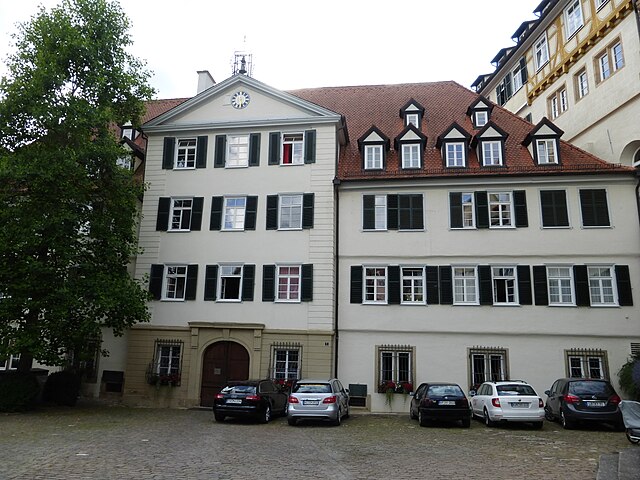Top Qs
Timeline
Chat
Perspective
Tübinger Stift
German theological school From Wikipedia, the free encyclopedia
Remove ads
The Tübinger Stift (German: [ˈtyːbɪŋɐ ˈʃtɪft] ⓘ) is a hall of residence and teaching; it is owned and supported by the Evangelical-Lutheran Church in Württemberg, and located in the university city of Tübingen, in South West Germany. The Stift was founded as an Augustinian monastery in the Middle Ages. After the Reformation, in 1536, Duke Ulrich turned the Stift into a seminary which served to prepare Protestant pastors for Württemberg. To this day the scholarship is still given to students in preparation for the ministry or teaching in Baden-Württemberg. Students receive a scholarship which consists of boarding, lodging and further academic support.
This article includes a list of general references, but it lacks sufficient corresponding inline citations. (January 2017) |

Some of the well known "Stiftlers" are the astronomer Johannes Kepler and his associate, statesman Hans Ulrich von Eggenberg, the poet Friedrich Hölderlin who had as roommates the philosophers G. W. F. Hegel and Friedrich Schelling (although the latter was five years their junior),[1][2][3] the theologians David Friedrich Strauß, Johann Albrecht Bengel, Friedrich Christoph Oetinger, Ferdinand Christian Baur and Eberhard Nestle, and the philologist August Pauly.
The curriculum included two years of philosophical studies and three years of theological studies.[3] The teaching staff imparted a traditional type of education, applying strict discipline and considerable censorship on the students' readings.[3] Nonetheless, during Hegel's tenure, students privately had access to the 'forbidden' texts of Spinoza, Kant and Voltaire.[3]
Remove ads
Alumni
- Nikodemus Frischlin, poet, playwright, humanist, mathematician, astronomer (1547–1590)
- Michael Maestlin, astronomer, mathematician (1550–1631)
- Hans Ulrich von Eggenberg, Statesman (1568–1634)
- Johannes Kepler, astronomer (1571–1630)
- Johann Valentin Andreae, theologian (1586–1654)
- Wilhelm Schickhardt, theologian, astronomer, universal scientist (1592–1635)
- Johann Albrecht Bengel, theologian (1687–1752)
- Friedrich Christoph Oetinger, theologian (1702–1782)
- Karl Friedrich Reinhard, French politician and diplomate (1761–1837)
- Karl Philipp Conz, poet, writer (1762–1827)
- Friedrich Hölderlin, poet (1770–1843)
- Georg Wilhelm Friedrich Hegel, philosopher (1770–1831)
- Friedrich Schelling, philosopher (1775–1854)
- Gustav Schwab, minister, poet, writer (1792–1850)
- Ferdinand Christian Baur, theologian (1792–1860)
- August Pauly, philologist (1796–1845)
- Wilhelm Hauff, writer (1802–1827)
- Wilhelm Waiblinger, poet, writer (1804–1830)
- Eduard Mörike, minister and poet (1804–1875)
- Friedrich Theodor Vischer, writer, professor of literature (1807–1887)
- David Friedrich Strauß, theologian, philosopher, writer (1808–1874)
- Hermann Kurz, poet, writer (1813–1873)
- Eduard Zeller, theologian, philosopher (1814–1908)
- Georg Herwegh, poet, revolutionist (1817–1875)
- Ferdinand von Hochstetter, geologist, naturalist (1829–1884)
- Albert Schäffle, economist, sociologist, politician (1831–1903)
- Eberhard Nestle, theologian, orientalist (1851–1913)
- Hans Vaihinger, philosopher (1852–1933)
- Johannes Hieber, politician (1862–1951)
- Karl Heim, theologian (1874–1958)
- Edwin Hoernle, politician (1883–1952)
Remove ads
References
Sources
External links
Wikiwand - on
Seamless Wikipedia browsing. On steroids.
Remove ads
